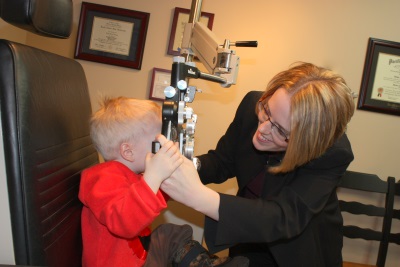Comprehensive Eye Exams

Comprehensive Eye Exams for Children, Teens & Adults
The eye examination process at Bauer & Clausen Optometry is designed to be exceptional from start to finish. Our goal with every appointment is to assess your vision, determine if any vision correction is necessary and evaluate the overall health of your eyes. Our eye doctors ensure your visit with us is both as thorough and comfortable as possible.
STEP
1
Learning more about you
As part of your eye exam, we will ask for information such as any medications you may take, your overall health, and of course any concerns you might have now about your vision. We also want to know about what we call “visual demands” or, in other words, the kinds of tasks you perform every day. Your visual demands may include frequently using a computer, working in an outdoor environment, having hobbies such as knitting or fly-tying, or even playing sports. All of these questions allow us to better tailor the exam to your specific needs.
STEP
2
Evaluating your visual system
We use a variety of techniques to check what we refer to as your visual system. This means checking the ability of your eye to control movement, checking your peripheral vision, evaluating eye alignment, determining whether you may have any color deficiencies, and ensuring your pupils function properly. This process is key in our ability to not only evaluate how well you see, but how well your eyes work independently and together.
STEP
3
Determining eye power
This is what many people think of when they consider having an eye exam. During this step, which is called a “refraction,” our doctors will ask you to view an eye chart. They will then make various adjustments and ask you to identify whether a letter or series of letter is more or less clear. Other measurements may also be taken during this time, all of which are designed to determine whether you need glasses or other correction.
STEP
4
Focusing on your eye health
Ocular health is a key component of good vision. That’s why our eye doctors thoroughly evaluate both the front surface of your eye as well as the retina, which is located on the inside and back of your eye. As they do so, they will look for potential concerns like dryness, eye infections, cataracts, glaucoma and macular degeneration. It may also surprise you to learn they’re evaluating other conditions, including high blood pressure, high cholesterol and even diabetes.
Optomap Imaging & Pupil Dilation
If you have previously had a comprehensive eye exam, you may have had drops placed in your eyes to dilate each pupil. Traditionally, this was the only way eye doctors could evaluate the retina. Advances in technology have expanded those options, however, and at Bauer & Clausen Optometry, we have chosen to make those options available to our patients when appropriate.
Optomap Retinal Imaging is an alternative to pupil dilation. Instead, a wide-field digital photo is taken of the back of your eye using a specialized camera. The process takes only a matter of seconds, requires no eye drops, and is pain-free. Your eye doctor is able to review the image with you to assess whether any concerns exist.
Keep in mind that because your eye health is so important to us, our eye doctors may still recommend you undergo dilation if they have concerns about the imaging results.
In addition, most insurance companies do not cover Optomap Retinal Imaging at this time.



